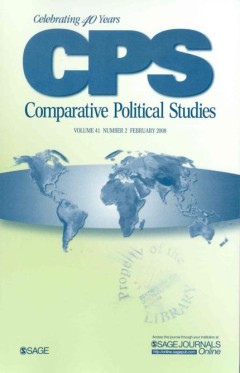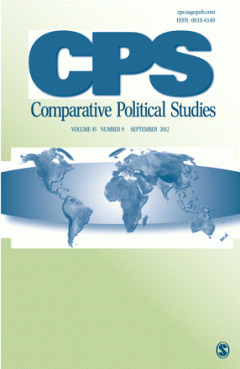Filter by

Policy Positions, Issue Importance, and Party Competition in New Democracies
This article examines the dynamics of vote redistribution after new party entry in the context of East European democracies. Contrary to the dominant institutional and sociological approaches, the author focuses on the (strategic) policy choices of the new contestants. The author argues that a new party's choice about where to place itself in relation to existing parties and which issues to emp…
- Edition
- Vol. 41, No. 1, January 2008. Page 48-72
- ISBN/ISSN
- 0010-4140
- Collation
- -
- Series Title
- Comparative Political Studies
- Call Number
- -

Who Gives, Who Receives, and Who Wins?: Transforming Capital Into Political C…
How does international support for nongovernmental organizations (NGOs) lead to political change in the developing world? Massive amounts of domestic government spending and international aid are now distributed through NGOs instead of state bureaucracies. Recent scholarship suggests that this decentralization of developmental aid to NGOs has unintended political effects on recipient communiti…
- Edition
- Vol. 41, No. 1, January 2008. Page 24-47
- ISBN/ISSN
- 0010-4140
- Collation
- -
- Series Title
- Comparative Political Studies
- Call Number
- -

Parliamentary Cycles and Party Switching in Legislatures
This article examines politicians' changes of party labels during the life of a legislature. The authors view a legislator's choice of party as a strategic decision recurring throughout the parliamentary cycle. In their approach, individuals are open to switching parties as they pursue goals specific to the stage in the parliamentary cycle. Analyzing Italy and Russia, they identify among legisl…
- Edition
- Vol. 41, No. 1, January 2008. Page 99-127
- ISBN/ISSN
- 0010-4140
- Collation
- -
- Series Title
- Comparative Political Studies
- Call Number
- -

What Unites Right-Wing Populists in Western Europe?: Re-Examining Grievance M…
Unlike for the green party family, no empirically backed scholarly consensus exists about the grievances mobilized by populist right parties in Western Europe. To the contrary, three competing grievance mobilization models can be distinguished in the existing literature. These models focus on grievances arising from economic changes, political elitism and corruption, and immigration. This study…
- Edition
- Vol. 41, No. 1, January 2008. Page 3-23
- ISBN/ISSN
- 0010-4140
- Collation
- -
- Series Title
- Comparative Political Studies
- Call Number
- -

Are Less-Involved Voters the Key to Win Elections?
The literature highlights how different individual levels of political interest and knowledge matter for political attitudes and behavior. A logical-quantitative voting model is thus proposed for a two-party system, based on voters' left—right ideological positions and their degree of political involvement. The model hypothesizes that although more involved voters generally behave in ac…
- Edition
- Vol. 41, No. 2, February 2008. Page 217-241
- ISBN/ISSN
- 0010-4140
- Collation
- -
- Series Title
- Comparative Political Studies
- Call Number
- -

National Actors in International Organizations: The Case of the European Comm…
This article examines the conditions under which the policy positions of an international organization correspond to the positions of relevant national actors. The commission of the European Union (EU) is often portrayed as an autonomous supranational actor, insulated from national interests. Recent analyses question this view, arguing that the commission is an agent in a principal—agen…
- Edition
- Vol. 41, No. 2, February 2008. Page 169-192
- ISBN/ISSN
- 0010-4140
- Collation
- -
- Series Title
- Comparative Political Studies
- Call Number
- -

Theories of Policy Diffusion: Social Sector Reform in Brazil
Brazil's democratic constitution granted municipalities responsibility to design and implement social policies, allowing for tailored programs to meet local constituent demands. Yet instead of pursuing local diversity, many governments chose to emulate programs made famous elsewhere. What explains the diffusion of social programs across Brazil? This article investigates whether policy mak…
- Edition
- Vol. 41, No. 2, February 2008. Page 193-216
- ISBN/ISSN
- 0010-4140
- Collation
- -
- Series Title
- Comparative Political Studies
- Call Number
- -

The Institutional Logic of Welfare Attitudes: How Welfare Regimes Influence P…
Why are people who live in liberal welfare regimes so reluctant to support welfare policy? And why are people who live in social democratic welfare regimes so keen to support welfare policy? This article seeks to give an institutional account of these cross-national differences. Previous attempts to link institutions and welfare attitudes have not been convincing. The empirical studies ha…
- Edition
- Vol. 41, No. 2, February 2008. Page 145-168
- ISBN/ISSN
- 0010-4140
- Collation
- -
- Series Title
- Comparative Political Studies
- Call Number
- -

Agrarian Tenure Institution Conflict Frames, and Communitarian Identities: Th…
Drawing on a survey of more than 4,000 respondents, this article argues that contrary to claims by the 1994 Zapatista insurgency, indigenous and nonindigenous respondents in southern Mexico have been united more by socioeconomic and land tenure institution variables than by ethnic identity. Based on statistical models, it concludes that in rural southern Mexico, ethnicity alone is less importan…
- Edition
- Volume 42, Number 1, January 2009. pp. 82-113
- ISBN/ISSN
- 00104140
- Collation
- -
- Series Title
- Comparative Political Studies
- Call Number
- -

Economic Origins of Electoral Support for Authoritarian Successors: A Cross-N…
This study explores how economic performance prior to democratic transitions affects the fate of successors to authoritarian rulers in new democracies. It investigates 70 founding election outcomes, finding that successful economic performance under an authoritarian regime increases the vote share of successors. It also finds that the past economic performance of authoritarian rulers decr…
- Edition
- Vol. 41, No. 3, March 2008. Page 362-388
- ISBN/ISSN
- 00104140
- Collation
- -
- Series Title
- Comparative Political Studies
- Call Number
- -

Legitimacy and institutional change: the case of China
What explains the nature of institutional change in post-1989 China? Dominant theories of institutional change focus on economic-rationalist, sociopolitical, or historical causes. Yet they have trouble explaining the pattern of institutional change in China. An alternative legitimacy-based perspective is proposed here that provides a more parsimonious and general theory of institutional change …
- Edition
- Vol. 41, No. 3, March. Page 259-284
- ISBN/ISSN
- 0010-4140
- Collation
- -
- Series Title
- Comparative Political Studies
- Call Number
- -

Constraints and Choices: Electoral Participation in Historical Perspective
Participation in electoral politics is not a fully voluntary act. Suffrage rules regulate who can participate, whereas institutional arrangements affect incentives to vote by shaping the consequences of the voting act. The secular increase of electoral participation in the world during the past two centuries was largely due to extensions of suffrage rather than to increased turnout of those eli…
- Edition
- Volume 42, Number 1, January 2009. pp. 4-30
- ISBN/ISSN
- 0010-4140
- Collation
- -
- Series Title
- Comparative Political Studies
- Call Number
- -

Gender Quotas, Electoral Laws, and the Election of Women: Evidence From the L…
This study uses district-level data from national legislative elections in 19 Latin American countries to evaluate the effect of gender quota legislation, in concert with other electoral rules, on the election of women legislators. Well-designed quota legislation has a profound positive impact on the election of women, regardless of the type of party list (closed or open). Where quota legislati…
- Edition
- Volume 42, Number 1, Jabuary 2009. pp. 56-81
- ISBN/ISSN
- 0010-4140
- Collation
- -
- Series Title
- Comparative Political Studies
- Call Number
- -

The local connection: local government performance and satisfication with dem…
In light of extensive decentralization in much of the world, analyses of citizen satisfaction with democracy that treat citizens as subjects of their national governments alone are incomplete. In this article,the author uses regression analysis of unique survey data from Argentina to explore the relationship between local government performance and citizen satisfaction with democracy. She demon…
- Edition
- Vol. 41, No. 3, March 2008. Page 285-308
- ISBN/ISSN
- 00104140
- Collation
- -
- Series Title
- Comparative Political Studies
- Call Number
- -

Who Knows Best what the People Want: Women or Men?:A Study of Political Repre…
The notion of representation lies at the heart of liberal democratic thinking, and over the years considerable effort has gone into defining and measuring the concept. The least common denominator in the voluminous literature is that in a representative political system there should be a certain amount of attitudinal congruence between masses and elites. One much-debated strategy for obtaining …
- Edition
- Volume 42, Number 1, January 2009. pp. 31-55
- ISBN/ISSN
- 00104140
- Collation
- -
- Series Title
- Comparative Political Studies
- Call Number
- -

The Logic of Historical Explanation in the Social Sciences
Historical explanations seek to identify the causes of outcomes in particular cases. Although social scientists commonly develop historical explanations, they lack criteria for distinguishing different types of causes and for evaluating the relative importance of alternative causes of the same outcome. This article first provides an inventory of the five types of causes that are normally used i…
- Edition
- Volume 42, Number 1, January 2009. pp. 114-146
- ISBN/ISSN
- 00104140
- Collation
- -
- Series Title
- Comparative Political Studies
- Call Number
- -

Ethnic Diversity and Generalized Trust in Europe: A Cross-National Multilevel…
While most current research documents a negative relation between ethnic diversity and generalized trust, it has to be acknowledged that these results often originate from one-country analyses in North America. In this article, attitudinal measurements from the European Social Survey are combined with Organization for Economic Co-Operation and Development data on migration patterns, thus examin…
- Edition
- Volume 42, Number 2, February 2009.pp. 198-223
- ISBN/ISSN
- 00104140
- Collation
- -
- Series Title
- Comparative Political Studies
- Call Number
- -

Political Survival and Endogenous Institutional Change
Incumbent political leaders risk deposition by challengers within the existing political rules and by revolutionary threats. Building on Bueno de Mesquita, Smith, Siverson, and Morrow's selectorate theory, the model here examines the policy responses of office-seeking leaders to revolutionary threats. Whether leaders suppress public goods such as freedom of assembly and freedom of information t…
- Edition
- Volume 42, Number 2, February 2009.pp. 167-197
- ISBN/ISSN
- 00104140
- Collation
- -
- Series Title
- Comparative Political Studies
- Call Number
- -

Do Electoral Rules Matter?: Political Institutions and Foreign Direct Investm…
Despite the growing importance of domestic institutions in the political economy literature, few studies explore the effects of disaggregated measures of political institutions, specifically electoral rules and systems, on foreign direct investment (FDI). Building on institutional accounts, this articles tests the effects of electoral rules on FDI inflows for 16 Latin American countries from 19…
- Edition
- Volume 42, Number 2, February 2009.pp. 224-251
- ISBN/ISSN
- 00104140
- Collation
- -
- Series Title
- Comparative Political Studies
- Call Number
- -

How Do Ideas Matter?: Mental Models and Attention in German Pension Politics
How do ideas affect political decision making? Despite much evidence that ideas matter, relatively little is known about the specific mechanisms through which they influence actors' beliefs, goals, and preferences. Drawing on psychological findings, the article elaborates a cognitive mechanism through which ideational frameworks shape political elites' preferences among options. It argues that …
- Edition
- Volume 42, Number 2, February 2009. pp. 252-279
- ISBN/ISSN
- 00104140
- Collation
- -
- Series Title
- Comparative Political Studies
- Call Number
- -
 Computer Science, Information & General Works
Computer Science, Information & General Works  Philosophy & Psychology
Philosophy & Psychology  Religion
Religion  Social Sciences
Social Sciences  Language
Language  Pure Science
Pure Science  Applied Sciences
Applied Sciences  Art & Recreation
Art & Recreation  Literature
Literature  History & Geography
History & Geography